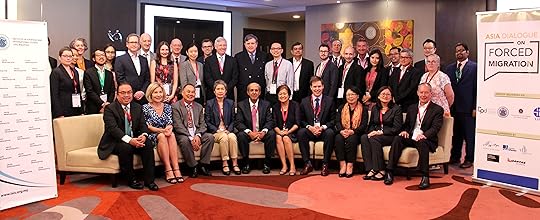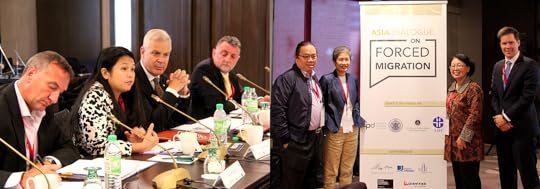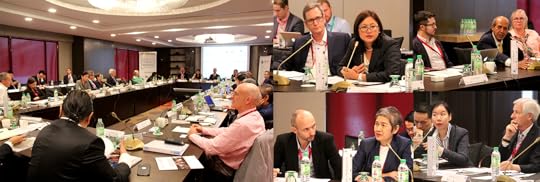Centre for Policy Development's Blog, page 37
October 2, 2016
Fellows Chris Bonnor and Bernie Shepard continue to feature prominently in ongoing school funding debates
The analysis of our Fellows Chris Bonnor and Bernie Shepard continues to underpin the ongoing debate over the discrepancies in funding levels between Australian public, private and Catholic schools.
The opinion and analysis of Chris and Bernie on unfair funding featured prominently in The Age again this week following Education Minister Simon Birmingham’s appearance and comments on ABC’s Q&A programme. For Chris, Minister Birmingham’s acknowledgement that some private schools are “over-funded” is a very welcome development in the “very bruising debate” over funding inequality. Systemic funding inequities are particularly pronounced in Victoria as shown by Chris and Bernie’s data. As Minister Birmingham commences negotiations with his state and territory counterparts, Chris and Bernie call for a logical and fair funding framework to be implemented.
Read the two pieces in The Age here and here.
Chris also wrote an editorial for CPD Fellow John Menadue’s blog recapping and analysing an eventful week which saw “one school funding revelation after another”. Read it here.
Read Chris and Bernie’s full report Uneven Playing Field: The State of Australia’s Schools here.

The post Fellows Chris Bonnor and Bernie Shepard continue to feature prominently in ongoing school funding debates appeared first on CPD.
September 28, 2016
Fellows Chris Bonnor and Bernie Shepard continue to feature prominently in ongoing school funding debates
The analysis of our Fellows Chris Bonnor and Bernie Shepard continues to underpin the ongoing debate over the discrepancies in funding levels between Australian public, private and Catholic schools.
The opinion and analysis of Chris and Bernie on unfair funding featured prominently in The Age again this week following Education Minister Simon Birmingham’s appearance and comments on ABC’s Q&A programme. For Chris, Minister Birmingham’s acknowledgement that some private schools are “over-funded” is a very welcome development in the “very bruising debate” over funding inequality. Systemic funding inequities are particularly pronounced in Victoria as shown by Chris and Bernie’s data. As Minister Birmingham commences negotiations with his state and territory counterparts, Chris and Bernie call for a logical and fair funding framework to be implemented.
Read the two pieces in The Age here and here.
Read Chris and Bernie’s full report Uneven Playing Field: The State of Australia’s Schools here.

The post Fellows Chris Bonnor and Bernie Shepard continue to feature prominently in ongoing school funding debates appeared first on CPD.
September 21, 2016
Third meeting of the Asia Dialogue on Forced Migration | September 2016
The third Dialogue meeting took place in September 2016. Download key documents below and read on for more about the meeting, including photos.
Key documents for the third Dialogue meeting:
Participant profiles
Full agenda and participant list
Briefing papers
Supplementary Business Session pack
Press Release, article in the New Straits Times and the Conversation
Further information:
For the Dialogue home page click here
To find out more about the rationale behind the Dialogue process click here
To read more about the second Dialogue meeting in Bangkok in January 2016 click here.
To read more about the first Dialogue meeting in Melbourne in August 2015 click here.
The third meeting of the Asia Dialogue on Forced Migration was held in Kuala Lumpur on 4-6 September 2016.
The Dialogue meeting was hosted by the Institute of Strategic and International Studies (ISIS), Malaysia.
The Dialogue is going from strength to strength, proving its value as a neutral place to discuss policy and operational options for States and others who are grappling with complex forced migration issues in the region.
After successfully engaging and influencing the Bali Process earlier in 2016, we intended to follow up with a solid policy agenda and outreach to a broader set of stakeholders in the second year of the Dialogue. We achieved much of this in our Kuala Lumpur meeting.

We once again had an excellent group of individuals participating. We were honoured to have Khun Kasit Piromya, former Foreign Minister of Thailand, participate in the meeting and address us at our Dialogue Dinner. He reminded us of the need to maintain a focus on our common humanity as well as striving for the political and institutional leadership needed to address forced migration in the region.
New Dialogue members included Hasan Kleib (Director General of Multilateral Affairs, Ministry of Foreign Affairs Indonesia), Chowdhury Abrar (Director of Refugee and Migratory Movements Research Unit, University of Dhaka, Bangladesh), Patcharamon Siriwatana (Department of International Organisations, Ministry of Foreign Affairs of the Kingdom of Thailand), Elina Noor (Director of Foreign Policy and Security Studies, ISIS Malaysia).
In a special Business Panel Session, the Dialogue heard from regional business leaders, including John WH Denton (Partner and CEO of Corrs Chambers Westgarth, and First Vice Chairman of the International Chamber of Commerce), Hui Mien Lee (Head of Sustainability, IKEA South East Asia) and Simon Lord (Group Sustainability Officer, Sime Darby Berhard). Dialogue members also visited the Rohingya Society in Malaysia and spoke with members of the Rohingya community in Kuala Lumpur.

Discussion and resolutions
The Dialogue continued its focus on better long-term preparedness for mass displacement in the region, including the national capacities, policies, standards and regional structures needed to respond better to all forms of forced migration now, and into the future.
Dialogue members explored the security considerations of forced migration, recognising that law and order and community safety issues are legitimate priorities and responsibilities of governments in the region. Although the links between these concerns and forced migration can be misperceived, Dialogue members noted that there is a particular security threat in not knowing who is in one’s territory. Members agreed to communicate to regional stakeholders that responding to the challenge of identification and registration of forced migrants in a predictable and coordinated way is a necessary condition to facilitating more secure and prosperous outcomes for governments, communities and individuals.
The private sector are increasingly aware of the commercial and geostrategic risks associated with mass displacement crises. Business can and do play an influential role in addressing forced migration through investing in humanitarian support for fragile environments, counteracting trafficking and exploitation in recruitment and supply chains, and working with government to expand labour migration pathways for forced migrants. We agreed to the inclusion of business representatives in future Dialogue meetings and to engage the private sector strategically to build a business case for more concerted action on forced migration.
Dialogue members plotted the key points we will make in our submission to the Bali Process Andaman Sea Crisis Review. This will include detailed consideration of how the Bali Process might operationalise the commitments made in the Bali Declaration to respond effectively to future mass displacement in the region. Of particular focus will be how the new consultation mechanism can be developed to broker early understanding of situations of potential, and actual, displacement, and generate co-ordinated and effective responses. This may include leveraging core contact groups in affected countries and developing an early warning system to prevent and manage displacement.
We considered how ASEAN can take a more constructive role in the interest of its member states, including by expanding its disaster management activities to include mass displacement, and will write directly to ASEAN and encourage it to take a coordinated approach to the governance of forced migration issues in the region. The ASEAN Secretariat will be invited to participate in our next meeting.
The fourth Dialogue meeting will be held in Indonesia in March 2017 and will focus on human trafficking. The fifth meeting will be held in the second half of 2017.
As the world negotiates the Global Compacts on Refugees and Safe, Orderly and Regular Migration, the Asia Dialogue on Forced Migration will continue to advance an effective, dignified and durable approach to forced migration in our region.


The post Third meeting of the Asia Dialogue on Forced Migration | September 2016 appeared first on CPD.
Policy Director Sam Hurley on Radio National ‘Outsiders’
CPD Policy Director Sam gives his take on Pauline Hanson’s maiden speech and her American analogue the Donald on ABC Radio National’s Outsiders with Jonathan Green.
Sam joined Eleanor Jackson from Peril Magazine and writer Rebecca Weisser to discuss the first week of the 45th Parliament and the political debuts of our new Senators. The discussion grapples with the willingness and need to listen to extreme views, no matter how out of step they may be with mainstream or personal political and moral opinion. In multicultural nations like Australia and America, a multiplicity of views must be tolerated and be listened to.
Listen to their conversation here.
Outsiders @RebeccaWeisser @eleanorjjackson @samhurley05 talk Hanson, Trump & reform of the family law court:https://t.co/Vb8HS29lLc #abcrn
— RN Sunday Extra (@RNSundayExtra) September 17, 2016

The post Policy Director Sam Hurley on Radio National ‘Outsiders’ appeared first on CPD.
September 20, 2016
CEO Travers McLeod talks forced migration and refugee intakes on RN ‘Drive’
On Wednesday night, Travers McLeod was invited on to the Radio National Drive Programme to discuss the recent high-level meetings on refugees and migrants.
Travers spoke with Jonathan Green about the role Australia played at the UN Summit for Refugees and Barack Obama’s Leaders Summit on Refugees. After unpacking the announcements made by PM Turnbull on Australia’s contributions to this emerging problem, Travers points out that little of the debate in New York summits was focused on our region. The attention of domestic and international leaders and policy makers needs to shift to the Asia Pacific, which will be threatened greatly by forced and irregular migration in the coming decades. The Asia Dialogue on Forced Migration will have a significant role to play in the future of our regional security and relations.
Listen to their conversation here.
Read more about the latest meeting of the Asia Dialogue on Forced Migration here.
Image credit: Jake Nowakowski News Corp Australia.

The post CEO Travers McLeod talks forced migration and refugee intakes on RN ‘Drive’ appeared first on CPD.
Fellows Chris Bonnor and Bernie Shepard demonstrate the inconsistencies in school funding in new essay
Following the release of their number crunching report on the unfairness and inequalities of our current school funding system, CPD Fellows Chris Bonnor and Bernie Shepard implore education ministers to review the evidence for reform.
Bonnor and Shepard once again use data mined from the MySchool website to illustrate the stark contrast across state borders in funding levels, and how they relate to socio-economic advantage in neighbouring schools. There is a demonstrable public-funding gap which favours richer schools over poor. The schools which receive more funding are not to blame for this asymmetry, and in short, our current system is in a ‘state of chaos’ lacking logic and consistency. Bonnor and Shepard cut through the extensive commentary on school funding levels and state the reasons for a needs-based funding model. This is “everyone’s mess” and needs to be urgently addressed by our Education Ministers.
Read their full essay here.
Read their full report Uneven Playing Field: The State of Australia’s Schools here.

The post Fellows Chris Bonnor and Bernie Shepard demonstrate the inconsistencies in school funding in new essay appeared first on CPD.
September 19, 2016
Fellow Peter Whiteford analyses a new ‘investment approach’ to social services
CPD Fellow Peter Whiteford outlines the intricacies and analyses the calculations behind the Coalition’s tentative entry into the new ‘investment approach’ to funding welfare.
Writing for The Conversation, Peter unpacks the “$4.8 trillion dollar question” that was posed by Social Services Minister Christian Porter’s recent report on the lifetime costs of Australia’s social security. This large welfare bill was calculated with actuarial analysis, an experimental method imported from New Zealand. This figure is being used to justify the implementation of an approach of targeted investments in social security that are tied to outcomes for the disadvantaged and welfare dependent. Peter shows how the Government arrived at this potentially inflated figure, and flags likely indicators for success for this new policy approach.
You can read Peter’s full piece here.
To find out more about New Zealand’s pioneering ‘investment approach’, CPD Policy Director Rob Sturrock recently went on a fact-finding and sharing mission across the Tasman. Read about his discoveries and the implications for Australia here.

The post Fellow Peter Whiteford analyses a new ‘investment approach’ to social services appeared first on CPD.
Fellow Chris Bonnor comments on more new findings on unfairness in education funding
CPD Fellow Chris Bonnor comments on Fairfax’s recent findings that state schools are scrambling for funding and are increasingly divided by socio-economic status.
The contrast between the fees and payments by parents to wealthy and poorer schools in Australia is dramatic, ranging from over $3000 to just $92. This is not surprising for Bonnor, who says it’s “no wonder schools are looking around for extra money”. The inequalities inherent in the education funding system were shown by Chris Bonnor and Bernie Sherpard in recent CPD report, Uneven Playing Field: The State of Australia’s Schools. The report found that between 2009 and 2014, independent and Catholic schools received a far greater increase in funding than state schools.
Read more on the Fairfax findings and Chris’ full comments here.

The post Fellow Chris Bonnor comments on more new findings on unfairness in education funding appeared first on CPD.
September 16, 2016
Fellow Ian McAuley sets out the negatives of neo-liberalism for modern democracies
CPD Fellow Ian McAuley discusses the challenges that will face our new government in an era of instability, due to both domestic politics and macroeconomic forces of globalisation.
Writing for New Matilda, Ian explains our current global economic system and our precarious place in it with an outline of the history of post-war capitalism and its transition to elitist neo-liberalism. What was once a policy and ideology that benefitted all, economic openness and free trade has become fundamentally unfair. We are seeing the large-scale political retaliations in Brexit and the rise of Donald Trump. Ian warns that Prime Minister Turnbull and his team must be weary of the rising backlash against globalisation and economic openness and include those in society who are being left behind.
Read Ian’s analysis here.

The post Fellow Ian McAuley sets out the negatives of neo-liberalism for modern democracies appeared first on CPD.
August 25, 2016
Fellow Mark Triffitt reviews the kaleidoscopic nature of our new Parliament
CPD Fellow Mark Triffitt takes a look at the new makeup of the 45th Parliament of Australia and the increasingly insular and predictable nature of federal politics.
For The Conversation, Mark describes an uninspiring vision of the coming term of federal politics. We are likely to see Parliament “achieve little of real policy substance” or meaningful social change and an increase in more combative political party tactics. This will lead to even lower public perceptions of political leadership and widespread disillusionment and disconnection with politics. If steps are not taken to avoid this negativity and dysfunction we may enter a phase of politics where representation of independent and minor parties will increase to a point of an unworkable political kaleidoscope. However, despite this grim outlook, Mark poses ways in which our national politicians can lead the way in rejuvenating our democracy.
Read Mark’s analysis here.

The post Fellow Mark Triffitt reviews the kaleidoscopic nature of our new Parliament appeared first on CPD.
Centre for Policy Development's Blog
- Centre for Policy Development's profile
- 1 follower



